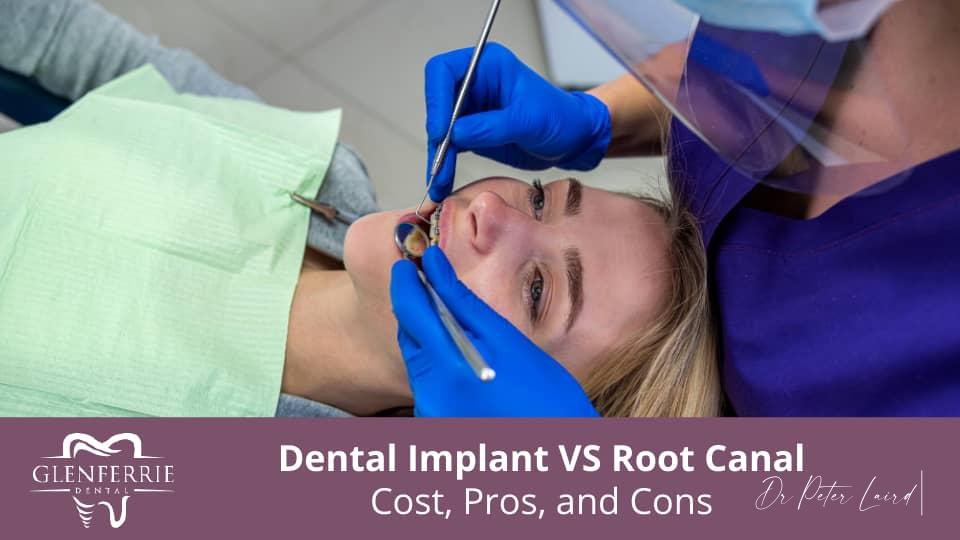Toothache is very devastating. Imagine trying to chew when suddenly you feel a sharp pain in your teeth. The moment your teeth start giving you severe pains, or there is an infection of the teeth’s nerves and pulp, your dentist recommends either a root canal or a dental implant as a solution.
However, this choice depends on a variety of factors. Factors such as gum disease, the condition of the remaining tooth, and the strength of the supporting bone play a huge role in the choice.
In getting a root canal, your dentist saves your teeth by removing the infected pulp and getting a replacement. However, a dental implant involves removing the original tooth and installing a metal post in the jawbone.
This article will explain the differences between dental implants and root canals. It also highlights the advantages and disadvantages you must know about each procedure. Keep reading to find out more.
What Are Dental Implants?
Dental implants are artificial tooth roots that help in supporting the restoration of missing teeth. Some dentists may refer to tooth implant treatment as cosmetic dentistry.
A dental implant involves your endodontist extracting and replacing the infected tooth with an artificial tooth.
A dental implant surgery goes in for a tooth replacement with metal and screw-like posts. The procedure is an option for dentures.
Pros
1. They offer great aesthetics
Though your natural tooth doesn’t get retained, dental implants offer you good aesthetics. Your dentist ensures the tooth imitates the natural tooth. Therefore, ensuring the implants blend well with your natural tooth.
Implants replace missing teeth so naturally that no one can find out you have false teeth without you telling them
2. Durability
Dental implants can last you a long time. Above other forms of dental and oral restoration, dental implants last much longer. With good and intensive care, they can even last for decades.
3. Prevent bone loss
Once you lose a tooth, you also start losing the bone mass around the missing tooth site. When your dentist places a dental implant in your jawbone, it strengthens the bone through osseointegration. It also prevents future bone loss.
Cons
1. Lengthy treatment process
The dental implant process is tedious and lengthy. The procedure cannot be done in a single visit except if you are doing same-day implants. It takes lots of visits and sometimes spans months.
2. Longer recovery period
Dental implant recovery needs a long time. The process involves spending time between the diverse stages waiting for your mouth to heal before proceeding to the next stage.
3. Insurance doesn’t cover a dental implant
Dental implants cost lots of money, making it difficult for insurance companies to cover them. Most dental insurance plans in Australia and beyond exclude dental implants.
4. Not suitable for everyone
A dental implant is not ideal for everyone. You can be excluded if you:
- Have a bone condition that affects bone healing.
- Have poor oral health and
- Your jaw is not large enough to carry the implant.
- Gum diseases can also increase the risk of implant failure.
What Are Root Canals?
A root canal treatment treats an infected tooth. Root canal therapy is also called endodontic therapy. The process is used in removing an infection from the tooth\’s pulp.
Though painful, it is a pain-relieving procedure. The specialist will remove the pulp and nerve of your teeth and cleanse them before sealing the inside.
A root canal treatment aims to save your natural tooth. You must require a root canal treatment before going for extractions which sometimes may not look like your natural teeth.
Pros
1. No loss of original tooth
You get to maintain your original tooth. Though you may need a crown to fix some decay, you will still retain most of your original features.
2. Less expensive
The cost of getting a root canal treatment is less expensive than most oral health treatment procedures. You may pay between $300 – $2500 for a root canal treatment as opposed to a more expensive dental implant.
3. The procedure takes less time
Unlike a dental implant, root canal treatment takes less time. A root canal treatment gets completed within one or two dental appointments. The waiting period for a permanent crown is also short.
Cons
1. The procedure may excessively damage your tooth
Your tooth may barely survive the procedure. This happens especially when the infection is severe.
The infection may be too deep and not save your tooth.
2. Tooth loss
There are chances that complications may result from the operation. These complications may lead to tooth loss.
Implant Vs Root Canals: Procedure
Dental Implant Procedure
You must first determine if implants are best for you, requiring consultation with your oral surgeon or periodontist. Your dental care provider thoroughly examines your teeth using x-rays and CT scans to ensure you have sufficient bone structure.
After the assessment, if there are underlying oral health conditions, your dentist treats them before starting the procedure.
Your dentist drills a hole into the jaw site to allow the implant placement. The implant screw gets placed with a cover screw on top for osseointegration.
After months of healing, your dentist uncovers the implant and attaches the abutment. Then, a fabrication of a temporary or permanent crown takes place. The entire process gets completed when the permanent crown replaces the temporary crown.
Root Canal Treatment Procedure
Before beginning, your dental care provider takes an x-ray of the affected tooth. With the result, he assesses and examines the damage extent and ensures a root canal treatment is appropriate.
Your dentist uses local anaesthesia to numb the infected tooth and the surrounding gums. A small rubber dam is placed in the area. The small rubber dam helps isolate the tooth and keep it dry during the procedure.
Now, your dentist opens the tooth crown to access the pulp. Then, dental instruments help remove the pulp nerves and tissues inside the tooth. The chamber and root canals get cleaned and shaped.
Your dentist fills the canals, and a temporary dental filling gets placed to seal the tooth. The dental filling also helps prevent future bacteria from entering.
The dentist then adds a dental crown to protect the tooth and restore your bite.

Implant VS Root Canals: Treatment Length
Root Canal Treatment
A root canal treatment may require about one to three appointments with your dentist. However, this depends on the amount of infection in your tooth.
On average, a root canal treatment takes about 30-60 minutes to complete. Sometimes, it can take an hour and a half.
Dental Implant
A dental implant procedure takes four months to a year to complete.
Implant VS Root Canals: Cost
A root canal treatment costs about $300 – $2500 per tooth, while a dental implant costs between $3000 – $4500 per implant.
Implant VS Root Canals: Maintenance
Dental Implant Maintenance
Dental implant maintenance is not very extensive. All you need is to take certain measures to ensure the implants are handled with care
- Practice good oral hygiene.
- Brush your teeth twice a day with a soft-bristled brush.
- Flossing your teeth regularly to maintain your dental health. Flossing helps remove plaques and tartar.
- Abstain from chewing tobacco and smoking.
- Engage in the routine dental check-up.
Root Canal
- Avoid aggressive brushing. Brush and floss gently. Use a soft-bristled toothbrush and do not force the floss between the teeth.
- Use saltwater to rinse your mouth at least three days after treatment. Also, rinse properly after brushing and flossing.
- Avoid hard and crunchy foods; take soft foods.
- Abide with all your dentist\’s instructions.
Implant VS Root Canals: Which Is Best For You?
Your dentist first assesses your tooth and considers your dental needs before recommending the best option for you. Your choice most often depends on your budget, preferences, and dental needs.
You can go with a dental implant if you have extensive tooth decay. But, if you are okay with preserving your natural tooth and understand the risk, you can go for a root canal treatment.
Whatever option you think is best for you, we are ready to help you out.
Frequently Asked Questions
Is Dental Implant Safer Than Root Canal?
Dental implants have a higher success rate than root canals.
How Long Does A Dental Implant Last?
Dental implants can last between 20- 30 years.
Do You Need Implant After Root Canal?
Yes, if your tooth is so damaged that it can’t be saved.
Who Should Avoid Dental Implants?
- Smokers
- Children (people below 18 years)
- Individuals with poor oral hygiene
Is It Better To Get A Tooth Implant Or Root Canal?
Your choice depends on the extent of damage to your teeth.
Choose The Right One For You
There is no special treatment that is the “ideal” one. The proper treatment depends on your preference or your dentist’s recommendation.
However, it is most advisable to visit a dental clinic that offers both procedures, like Glenferrie Dental Clinic. At Glenferrie, we offer specialised procedures, so you don’t have to worry about any future risks.
Our team of friendly dentists are very skilled, so you are assured you are in safe hands. The best part is that our services are very affordable. You don’t have to empty your bank accounts to get proper dental treatment.
Contact us now to get started on your consultation, then proceed to your treatment.
